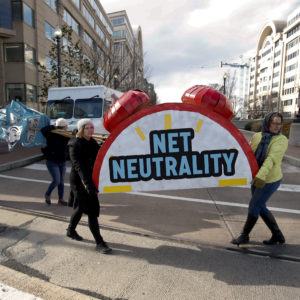Everyone understands how vital the internet has become to modern life. It’s one of the fastest spreading technologies in all of human history and an indispensable gateway to education, jobs, housing and government services. It’s where we find news, entertainment, culture and social connection — so much so that a third of Americans say their smartphone is more important to them than sex.
Protecting, strengthening and growing this irreplaceable resource thus must be among our highest national priorities.
A core part of that mission must be enacting an open internet law that will permanently ensure that every citizen can freely access the entire internet without discrimination, manipulation or abuse. Most people are familiar with this long-running battle, which has reached a boiling point in recent weeks as the issue rises to the top of the congressional agenda.
Even for a Congress that doesn’t accomplish much of anything these days, this should be an easy lift. The internet companies themselves all support permanent net neutrality rules that ban any blocking, throttling or discrimination online. Democrats and Republicans both recognize that without net neutrality, not only are their seats in danger but so are their messages to their constituents depending on how the political winds blow. And more than 80 percent of the public supports net neutrality as well.
So why don’t we have a net neutrality law already? The (predictable) answer — politics keeps getting in the way.
For some Republicans, no matter how well it polls, net neutrality will always be tainted as an idea pushed by Democrats and in today’s winner takes all “base first” politics, compromising with the enemy is simply not allowed. No matter how popular an idea becomes, the fear of offending fringe voices and drawing an extremist primary challenge can drag it down.
Meanwhile, a number of Democrats seem to prefer continuing to fight over net neutrality legislation — an issue they think puts Republicans on the defensive — instead of enshrining it as the law of the land. Rather than rallying support for permanent, lasting net neutrality, Democrats in this camp want Congress to use an unpopular maneuver called the Congressional Review Act to make a strong statement in support of net neutrality rules.
The problem is, this partisan, backward looking move cannot win enough support from Republicans to make it out of Congress and certainly will never be signed by President Trump. It gives Democrats a good campaign issue but does nothing to actually move the needle.
For all the gridlock in our politics, we face a ripe moment for Democrats and Republicans to work together on a more serious, genuine net neutrality law. Both sides have seen the issue bounce between the FCC, the courts and Congress for far too long and both know in their hearts that permanence is the answer.
People from across the political spectrum depend equally on a free and open internet. Republicans know the window for a deal that protects their priorities is shrinking as we get closer to the midterms as Democrats are expected to clean up, but Democrats know they are still three years or more away from wresting control of the White House and protecting net neutrality without cutting a deal, but the internet cannot wait that long.
Working together on a net neutrality law might not excite the fringes of the parties, but it would animate the broad middle that wants government to work together and get things done for the American people. For Democrats, it would enshrine a key progressive idea into a permanent law and for Republicans it would give them a positive achievement to campaign on in the fall.
And for both sides, it would bring closure to an issue that has dragged around Washington for far too long, freeing up space on the agenda to deal with other internet priorities such as boosting speeds, ensuring universal access to affordable service, closing the digital divide and protecting consumers from data-mining and invasion of their privacy online.
Congress should not settle for the counterproductive half-loaf “CRA” disapproval resolution — it should think big and pass a real binding, permanent net neutrality to protect consumers and keep the net free and open forever.

